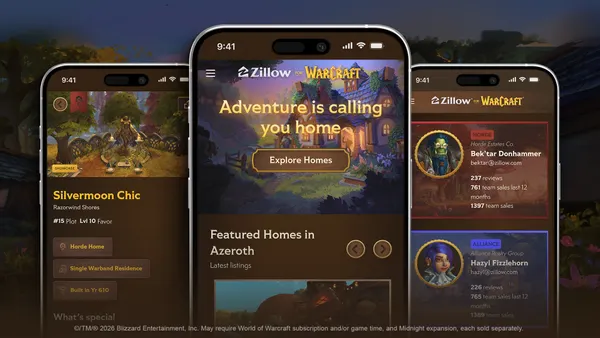Brief:
- Lego debuted its first line of building blocks that work with a mobile app to show augmented reality (AR) imagery. The "Lego Hidden Side" app will let kids see virtual ghosts in a series of eight "haunted" building sets that are expected to go on sale in August for $19.99 to $129.99, per an announcement.
- The free app will mark the first time that the toymaker introduces a play theme as a service that will be updated with additional features and gameplay. The first Lego Hidden Side experience asks kids to join lead characters Jack and Parker as they explore their fictional hometown and solve paranormal mysteries. Players need to hold up their phones to the Lego models to see and capture virtual ghosts as part of the game.
- Tom Donaldson, senior vice president at Lego's Creative Play Lab, said that while the company focuses on tactile building blocks, AR technology "presents opportunities to enhance physical LEGO play with new action and mastery elements." The Lego Hidden Side also has a short digital game that kids can play separately from the blocks.
Insight:
The growing popularity of smartphones and tablets has challenged toymakers over the past decade, but Lego's AR-enhanced building blocks may give kids a reason to combine their screen usage with physical play. Lego in September reported its first drop in revenue in 13 years and cut 8% of its workforce to simplify operations, per CNN. The company is among the toymakers that have suffered from the bankruptcy of Toys 'R' Us, the big-box chain that faced growing competition from discount stores like Walmart and e-commerce giant Amazon.
Lego's mobile focus has also affected how it has tried to extend its brand into other product lines, like clothing for adults. The toymaker this week started selling licensed clothes that only are available on Snapchat, the image-messaging app with 186 million users. Shoppers need to scan a Snapcode, a QR code that Snapchat's app can read, inside empty pop-up stores in the United States, United Kingdom, France and Germany to transport themselves to a shoppable AR boutique, per CNBC.
Like Lego, Countless marketers have used AR to increase brand awareness and drive engagement and sales. Earlier this month, L'Oréal Group's Lancôme worked with Alibaba’s cloud computing unit to unveil a Chinese New Year campaign that includes an augmented reality game and pop-up store.
The use of AR as a mobile gaming feature was popularized by "Pokémon Go," which first appeared in July 2016 and was downloaded more than 750 million times in its first year, leading to similar videogames that urge players to explore their real-world surroundings. Niantic, the co-developer of the game, this year plans to release "Harry Potter: Wizards Unite" based on the hit children's books by J.K. Rowling, per Variety.













